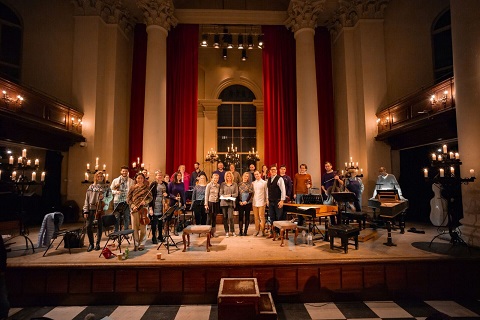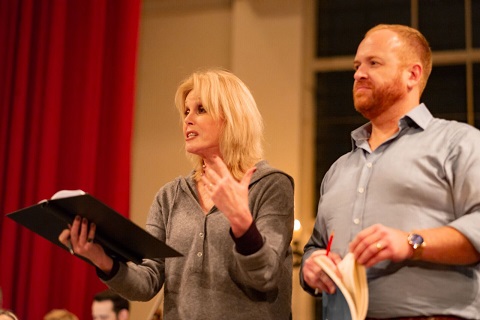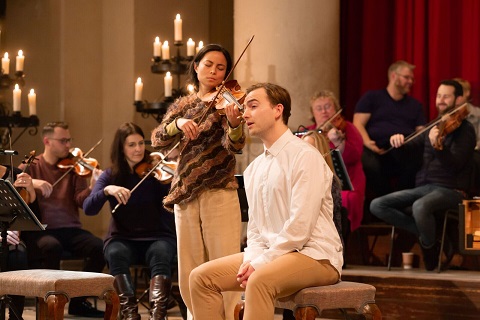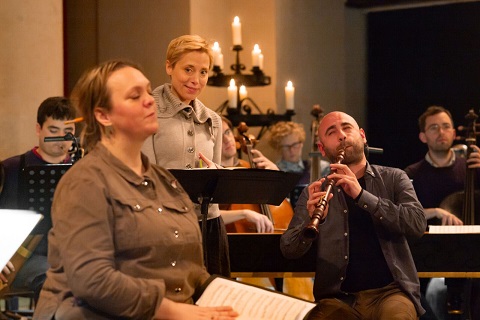
24 Jan 2019
La Nuova Musica perform Handel's Alcina at St John's Smith Square
There was a full house at St John’s Smith Square for La Nuova Musica’s presentation of Handel’s Alcina.
English Touring Opera are delighted to announce a season of lyric monodramas to tour nationally from October to December. The season features music for solo singer and piano by Argento, Britten, Tippett and Shostakovich with a bold and inventive approach to making opera during social distancing.
This tenth of ten Live from London concerts was in fact a recorded live performance from California. It was no less enjoyable for that, and it was also uplifting to learn that this wasn’t in fact the ‘last’ LfL event that we will be able to enjoy, courtesy of VOCES8 and their fellow vocal ensembles (more below …).
Ever since Wigmore Hall announced their superb series of autumn concerts, all streamed live and available free of charge, I’d been looking forward to this song recital by Ian Bostridge and Imogen Cooper.
The Sixteen continues its exploration of Henry Purcell’s Welcome Songs for Charles II. As with Robert King’s pioneering Purcell series begun over thirty years ago for Hyperion, Harry Christophers is recording two Welcome Songs per disc.
Although Stile Antico’s programme article for their Live from London recital introduced their selection from the many treasures of the English Renaissance in the context of the theological debates and upheavals of the Tudor and Elizabethan years, their performance was more evocative of private chamber music than of public liturgy.
In February this year, Albanian soprano Ermonela Jaho made a highly lauded debut recital at Wigmore Hall - a concert which both celebrated Opera Rara’s 50th anniversary and honoured the career of the Italian soprano Rosina Storchio (1872-1945), the star of verismo who created the title roles in Leoncavallo’s La bohème and Zazà, Mascagni’s Lodoletta and Puccini’s Madama Butterfly.
Evidently, face masks don’t stifle appreciative “Bravo!”s. And, reducing audience numbers doesn’t lower the volume of such acclamations. For, the audience at Wigmore Hall gave soprano Elizabeth Llewellyn and pianist Simon Lepper a greatly deserved warm reception and hearty response following this lunchtime recital of late-Romantic song.
Collapsology. Or, perhaps we should use the French word ‘Collapsologie’ because this is a transdisciplinary idea pretty much advocated by a series of French theorists - and apparently, mostly French theorists. It in essence focuses on the imminent collapse of modern society and all its layers - a series of escalating crises on a global scale: environmental, economic, geopolitical, governmental; the list is extensive.
For this week’s Live from London vocal recital we moved from the home of VOCES8, St Anne and St Agnes in the City of London, to Kings Place, where The Sixteen - who have been associate artists at the venue for some time - presented a programme of music and words bound together by the theme of ‘reflection’.
'Such is your divine Disposation that both you excellently understand, and royally entertaine the Exercise of Musicke.’
Amongst an avalanche of new Mahler recordings appearing at the moment (Das Lied von der Erde seems to be the most favoured, with three) this 1991 Mahler Second from the 2nd Kassel MahlerFest is one of the more interesting releases.
‘And there was war in heaven: Michael and his angels fought against the dragon; and the dragon fought and his angels, And prevailed not; neither was their place found any more in heaven … that old serpent … Satan, which deceiveth the whole world: he was cast out into the earth, and his angels were cast out with him.’
If there is one myth, it seems believed by some people today, that probably needs shattering it is that post-war recordings or performances of Wagner operas were always of exceptional quality. This 1949 Hamburg Tristan und Isolde is one of those recordings - though quite who is to blame for its many problems takes quite some unearthing.
There was never any doubt that the fifth of the twelve Met Stars Live in Concert broadcasts was going to be a palpably intense and vivid event, as well as a musically stunning and theatrically enervating experience.
‘Love’ was the theme for this Live from London performance by Apollo5. Given the complexity and diversity of that human emotion, and Apollo5’s reputation for versatility and diverse repertoire, ranging from Renaissance choral music to jazz, from contemporary classical works to popular song, it was no surprise that their programme spanned 500 years and several musical styles.
The Academy of St Martin in the Fields have titled their autumn series of eight concerts - which are taking place at 5pm and 7.30pm on two Saturdays each month at their home venue in Trafalgar Square, and being filmed for streaming the following Thursday - ‘re:connect’.
The London Symphony Orchestra opened their Autumn 2020 season with a homage to Oliver Knussen, who died at the age of 66 in July 2018. The programme traced a national musical lineage through the twentieth century, from Britten to Knussen, on to Mark-Anthony Turnage, and entwining the LSO and Rattle too.
With the Live from London digital vocal festival entering the second half of the series, the festival’s host, VOCES8, returned to their home at St Annes and St Agnes in the City of London to present a sequence of ‘Choral Dances’ - vocal music inspired by dance, embracing diverse genres from the Renaissance madrigal to swing jazz.
Just a few unison string wriggles from the opening of Mozart’s overture to Le nozze di Figaro are enough to make any opera-lover perch on the edge of their seat, in excited anticipation of the drama in music to come, so there could be no other curtain-raiser for this Gala Concert at the Royal Opera House, the latest instalment from ‘their House’ to ‘our houses’.
"Before the ending of the day, creator of all things, we pray that, with your accustomed mercy, you may watch over us."

There was a full house at St John’s Smith Square for La Nuova Musica’s presentation of Handel’s Alcina.
Were the expectant punters enticed by promise of a ‘prelude’ to the 2019 London Handel Festival - which runs from 27th March to 29th April - sung by a superb cast of soloists, or by the appearance of Joanna Lumley as the ‘narrator’ reading June Chichester’s recitative-replacing inter-aria text?
For, the evening’s performance was an “experiment”, one which, according to Katie Hawks’ programme article, “dipped in the waters of authenticity” by following the practice of German opera houses in Handel’s day of singing the recitatives of opera seria in the native language, while retaining the original Italian text of the arias. Here, though, the Italian recitative was done away with altogether, replaced by spoken English summaries which were “intended to convey the drama better”.
Certainly, the romantic entanglements of Alcina do require intricate unravelling. The opera premiered at Covent Garden in April 1735 during Handel’s first season at the Theatre Royal and presents episodes from Ariosto’s Orlando furioso in which the eponymous Sorceress lures heroes to her enchanted island, quickly becomes disenchanted with their merits and charms, and so casts spells which turn her former lovers into animals and trees, rocks and streams. The virtuous Bradamante - disguised as her brother Ricciardo - arrives on the island with her friend Melisso to rescue her fiancé, the bewitched Ruggiero. Complications ensue when Morgana, Alcina’s sister who is loved by the Sorceress’s steward, Oronte, falls in love with ‘Ricciardo’. Her jealousy aroused, Alcina sets out to turn the latter into a wild beast. Magic rings and Ruggiero’s moral awakening intervene, and the Sorceress finds herself suffering the afflictions of true love.
This drama, somewhat absurd and sometimes confusing, is presented in the recitatives; and, even if one does not understand the sung language, one can appreciate the tenor of the situation and action, the changing nature of the relationships, the pace of the drama. The recitatives provide the contexts for the emotional effusions of the arias. And, they provide contrasts of musical colour. Take them away and you’re left with the jewels without a chain to thread them together.
 Joanna Lumley and William Berger. Photo credit: Nick Rutter.
Joanna Lumley and William Berger. Photo credit: Nick Rutter.
Descending from her armchair-throne behind the instrumentalists, Joanna Lumley read June Chichester’s text - which often seemed simply to summarise the arias - with judicious lip-curling, eye-brow raising wryness. Occasionally she addressed a singer directly, at other times she re-positioned a music stand in advance of an aria. But, despite the clarity and nuance of her delivery (was amplification really necessary?), the musico-dramatic focus and momentum drooped during the spoken text. Conductor David Bates worked tremendously hard to drive the drama forwards and drew playing of tremendous rhythmic élan and textual clarity from La Nuova Musica. But, the performance didn’t have the sort of dramatic fluency that can carry the listener through the admitted irrationalities of some of the libretto’s romantic muddles and misunderstandings. I wasn’t convinced that the ‘experiment’ clarified the action, and the omission and re-ordering of some arias did not help in this regard.
John Caird (who is an Honorary Associate Director of the RSC and Principal Guest Director of the Royal Dramatic Theatre, Stockholm) was billed as the ‘director’, but I struggled to discern his contribution. The singers, most of whom used scores, simply did what good singers do; that is, respond naturally to the dramatic situation through voice, gesture, manner. They sang their arias in turn, sometimes standing amid the instrumentalists, sometimes behind them, often seated - unfortunately so in the latter case, given the poor sight-lines in SJSS. Even a simple lighting design would have enhanced our sense of the mystery and menace of Alcina’s fantastical realm, of the Sorceress’s struggle to control her victims and to understand the growing affections of her own heart. And, her devastation when both her magic powers and her former lovers, restored to human form, have vanished, leaving her alone and bereft. There was an elaborate display of candles above the seated singers at the rear, but it wasn’t clear what this was supposed to represent or evoke.
 Anaïs Chen and Patrick Terry. Photo credit: Nick Rutter.
Anaïs Chen and Patrick Terry. Photo credit: Nick Rutter.
Fortunately, the musical performances more than made up for these frustrations. Particularly impressive was countertenor Patrick Terry who conveyed both Ruggiero’s initial boyish need for reassurance and affection, and his subsequent self-knowledge when he comes to appreciate the emptiness of his earlier happiness. Handel’s original Ruggiero, the castrato Giovanni Carestini, so the story goes, was dissatisfied with the simplicity of the plaintive ‘Verdi prati’ - in which Ruggiero recognises that the beautiful green island is an illusion which will soon dissolve into a barren reality - and sent it back to Handel, whose riposte was that if Carestini didn’t sing the aria he would be paid nothing. I admired Terry’s singing when I first heard him perform in the Kathleen Ferrier Awards Final in 2017 (when he won the Song Prize), and the fullness of his tone and smoothness of line that I noted on that occasion have grown even more beguiling. ‘Verdi prati’ was the emotional heart of this performance, in which Ruggiero’s regret was enhanced by leader Anaïs Chen’s exquisite violin solo, but Terry was just as stirring in ‘Sta nell’Ircana’ - to which the natural horns of Anneke Scott and Joseph Walters offered a vibrant, colourful complement - phrasing the exuberant runs stylishly and powering sonorously to the final cadence.
 Madeleine Shaw, Rebecca Bottone and Leo Duarte. Photo credit: Nick Rutter.
Madeleine Shaw, Rebecca Bottone and Leo Duarte. Photo credit: Nick Rutter.
Rebecca Bottone was a characterful Morgana, her upper register shining. Morgana’s initial mischievous flirtatiousness was engagingly embodied by oboist Leo Duarte’s juicy obbligato, while the expressive phrasing of Morgana’s later plea for forgiveness was complemented by the gracious muscularity and plaintiveness of John Myerscough’s cello obbligato. Not surprisingly, Christopher Turner’s Oronte could not resist his wayward beloved’s entreaties, the nuanced legato line of his subsequent ‘Un momento di contento’ expressing the assuagement bestowed by true love. As the hollow-hearted Sorceress, Lucy Crowe sang with characteristic liquefaction and limpidity, but while Crowe’s elegance was unwavering, at times I found her tone rather ‘white’, and not fully expressive of Alcina’s wide-ranging emotions.
As Bradamante, Madeleine Shaw conveyed a feminine warmth beneath ‘Ricciardo’s’ vengeful anger, and baritone William Berger - who, like Terry, sang from memory - projected Melisso’s single aria well, displaying strength at the bottom of his range, and rising easily with even colour. I look forward to hearing both Berger and Terry again when they join the cast of Berenice, at the ROH’s Linbury Theatre, during the forthcoming London Handel Festival ‘proper’.
This performance of Alcina was warmly appreciated by the SJSS audience, and certainly whetted the appetite for this year’s LHF. But, oddly, the real ‘enchantment’ on this occasion occurred during the instrumental obbligatos, which were performed from memory with the solo players moving forward to participate in the ‘action’; here was real musical magic.
Claire Seymour
La Nuova Musica: Alcina
Alcina - Lucy Crowe, Ruggiero - Patrick Terry, Morgana - Rebecca Bottone, Bradamante - Madeleine Shaw, Ornote - Christopher Turner, Melisso - William Berger, Narrator - Joanna Lumley, Director - David Bates, Director - John Caird.
St John’s Smith Square, London; Tuesday 22nd January 2019.